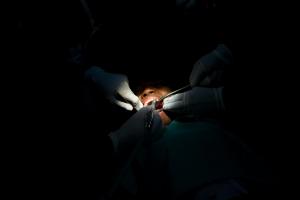Filling the gaps in oral health services in Africa
Brazzaville – More than 480 million people in the African region suffer from oral diseases such as dental caries and periodontal diseases, yet oral health remains a low priority in many countries, leading to inadequate financial and technical investment that undermine prevention and care services.
Disruptions by the COVID-19 pandemic in the health sector have exacerbated oral health services in the region, with around 90% of countries responding to a World Health Organization (WHO) survey reporting a complete or partial disruption of oral health services between February and July 2020. Countries have since made efforts to restore the delivery of essential services.
To help reinforce oral health services in Africa, WHO and the Harvard School of Dental Medicine are rolling out an online training for health workers at the primary care facility level. Africa has few trained oral health professionals. For example, the region had 3.3 dentists for 100 000 people between 2014 and 2019, almost less than one tenth of the global ratio of 32.8 per 100 000 population, according to the WHO National Health Workforce Account Data Platform.
Providing oral health training for primary care workers, including community health workers is one solution to meeting the needs for oral care services. The first phase of the training by WHO and the Harvard School of Dental Medicine—which has a global experience in workforce development—will be piloted in Angola, Kenya, Liberia and Senegal and entails reinforcing the competency of community health workers through developing online training course as well as starter kits for master trainers who will introduce the competency-based training for community health workers.
“We are rethinking the future of oral health care system, including through education and training and using digital platforms to improve the capacity of primary care workers as well as taking a more integrated approach to oral health service provision to meet the huge needs,” says Yuka Makino, Technical Officer for Oral Health at WHO Regional Office for Africa.
“Oral health services in most African countries are centred around oral health professionals and oral diseases. This means that there is little collaboration across and beyond health sectors. As such prevention of oral diseases by controlling modifiable risk factors such as tobacco use, alcohol consumption and an unhealthy diet high in free sugars which are common to the four leading noncommunicable diseases (cardiovascular disease, cancer, chronic respiratory disease and diabetes) is difficult,” Yuka points out.
Oral health is essential to good health and well-being over the entire life course. It also plays a crucial role in nutrition, employment, self-esteem and social interaction. However, many people continue to suffer from oral diseases, resulting in preventable pain, infection, reduced quality of life as well as productivity loss and learning disruptions among school children.
African countries have adopted a regional oral health strategy to address oral diseases as part of noncommunicable diseases towards universal health coverage, and WHO has provided technical and financial support to countries to develop and implement oral health policy and strategies at country levels. The Organization has supported 10 African countries to implement national programmes to eliminate noma—a disease that damages the mouth and the face and fatal in 90% of cases if untreated—as a public health problem. Noma is also a marker of extreme poverty.
The pilot training phase by WHO and the Harvard School of Dental Medicine is to be expanded to other African countries to scale up availability and quality of oral health services at primary care facility level.
The project has been supported by Hilfsaktion Noma e.V and the Borrow Foundation.
The link of the media announcement of the Harvard School of Dental Medicine: https://hsdm.harvard.edu/news/strengthening-oral-health-care-systems-africa
